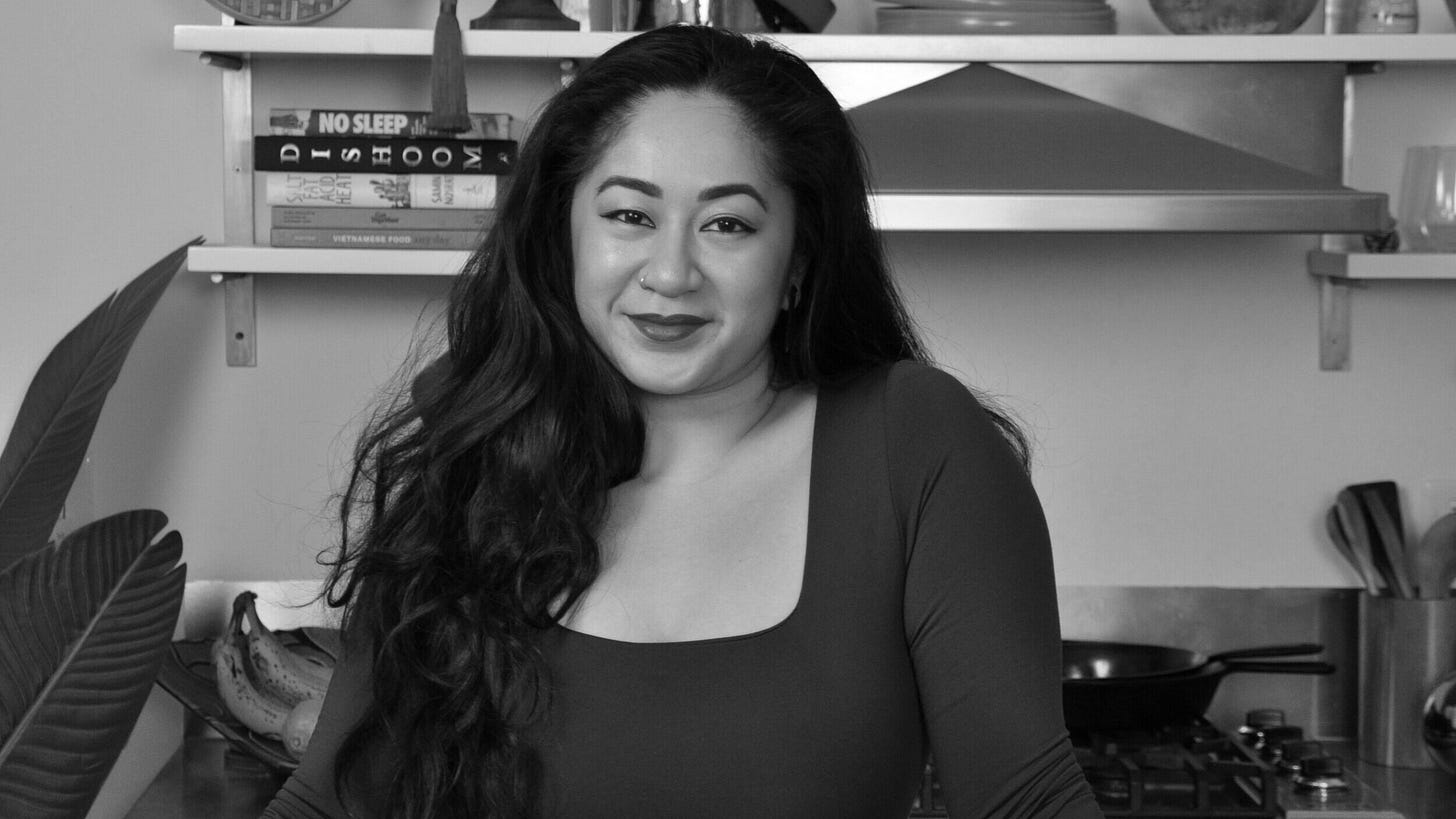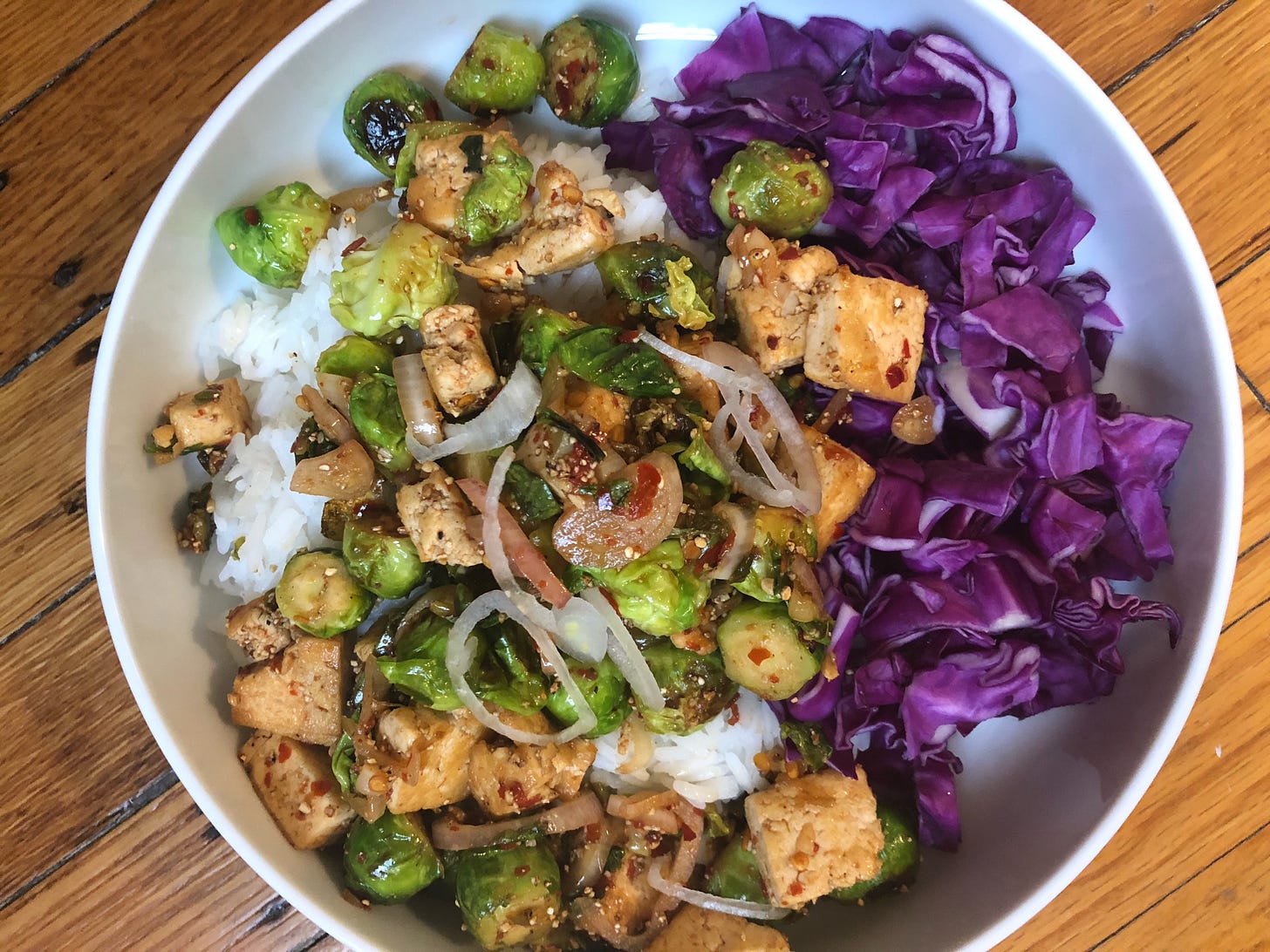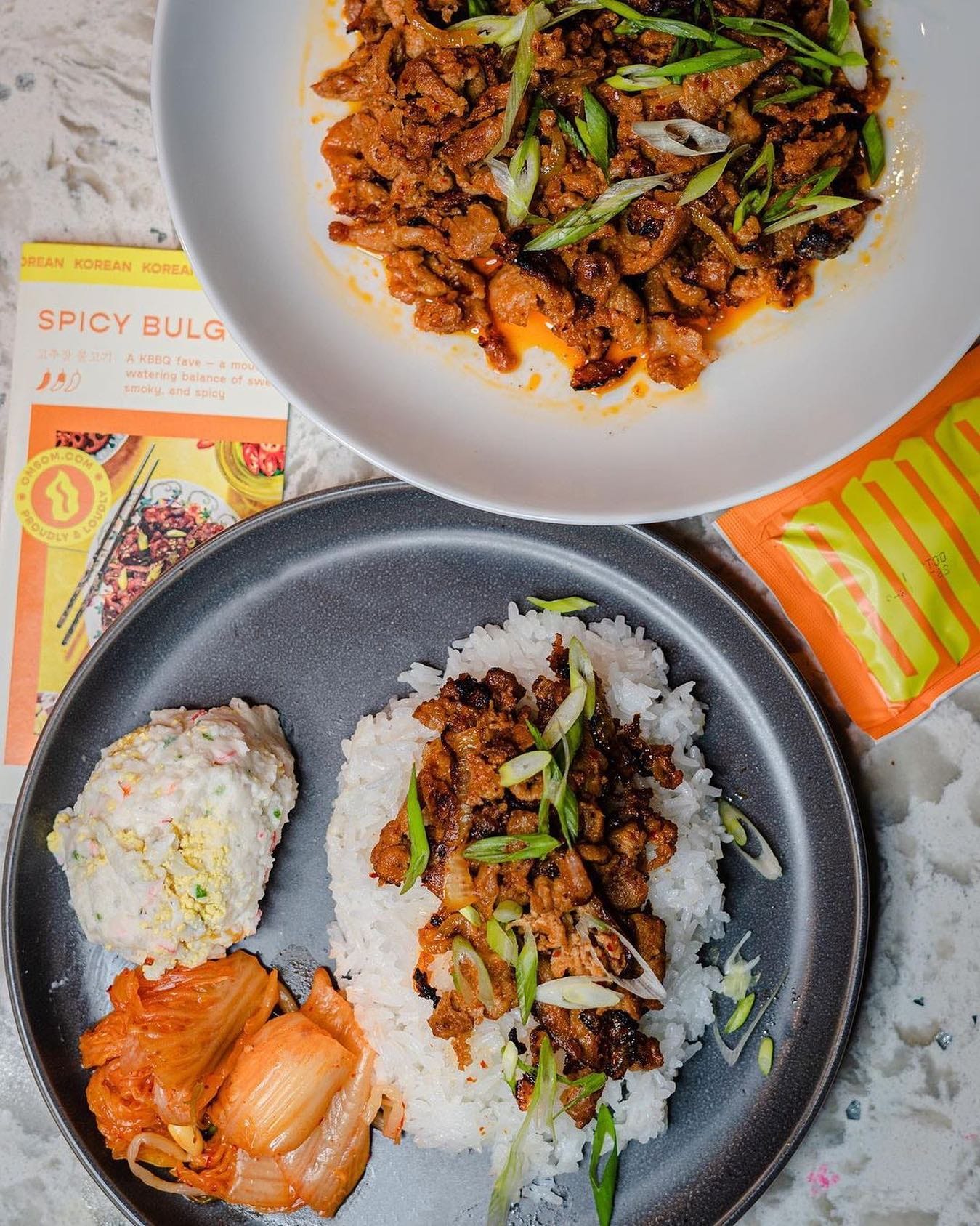Kim Pham is reclaiming the “ethnic” food aisle
A conversation with the co-founder of Omsom on building a business in a pandemic and starting an Asian food brand targeted at fellow Asian-Americans.
Why hello there! Welcome to on hand! If you’ve landed here and somehow aren’t subscribed, I got you:
Kim Pham, along with her sister Vanessa, are co-founders of Omsom, a company making starter packets for different Asian dishes. While this company had been in the works for about year, they launched at a time when the world was upside down and everything felt uncertain. I chatted with Kim over the phone to talk about building a business, starting an Asian food brand targeted at fellow Asian-Americans, and reclaiming the “ethnic” food aisle.
Brianna Plaza: I know that it's you and your sister Vanessa, but can you tell me how you got started building Omsom? What's your background?
Kim Pham: We are first generation Vietnamese Americans and daughters of refugees. Growing up, food was not only a love language, but was also a way for us to engage with our identities. We grew up in Boston in a really predominantly white town, and for a really long time had a lot of embarrassment and shame associated with our identities. It wasn't really until we got into our adulthood, that we realized just how important our culture and our heritage is to us, but also how food was such an integral piece of that identity.
Vanessa went to Harvard and then was a management consultant at Bain in the CPG and e-commerce department. I've been working in startups and venture capital for the past 10 years and I always wanted to start my own company, but just wasn't sure exactly when that would be.
Building a business came down to us thinking about how the DNA of this country is changing, where a third of the US population is now composed of immigrants and their children. When you look at products in mainstream "ethnic” aisles, many are really janky and old school and diluted, and they're just not at all representative of this changing fabric of the country. We basically decided we should quit our jobs and work on changing this because we care about it.
We are by no means culinary authorities, but food has been such a big part of our lives since day one. That's why we work with incredible tastemakers. We quickly realized that if we're going to build this company the right way, then we need to have the right folks in the room. And so, that's how the chef partner piece came about.
Brianna Plaza: How did you identify those chef partners?
Kim Pham: As we built Omsom, we knew we needed to make sure that folks of these cuisines and backgrounds are involved in every step of the way. I think with what we're seeing as part of a larger dialogue around under representation and appropriation in food media, it's really important to us that if we're going to honor and celebrate these flavors then we need to have folks who have the credibility to be speaking on those cuisines.
We started thinking about tastemakers — that's what we call our chefs. They are pioneering modern Thai, Filipino, and Vietnamese cuisine and we wanted to make sure that we had folks who had cut their teeth in these countries and cuisines, and could speak from a place of credibility, and that they would help us shape the product together.
We're based in New York so we looked at folks in our ecosystem. Chefs Chat and Ohm from Fish Cheeks are cooking the food they grew up with and aren’t diluting Thai flavors for American palettes. It would have been easy for them to open another Thai restaurant that has Americanized versions of dishes, but they decided they were not going to compromise.
We love Jimmy Ly of Madame Vo because he is really excited about shining a light on often underrepresented parts of Vietnamese cuisine. Everyone thinks Vietnamese cuisine is just pho and banh mi, but it's super, super complex. He opened up Madame Vo to show that barbecue culture is very big in Vietnam — no one knows that.
Our Filipina chef is Nicole Ponseca, owner of Jeepney, and she's incredible. She's doing an incredible job of showcasing and highlighting a cuisine in a country that is often so under-looked in the continent of Asia. The Philippines is a very, very unique country that is incredibly different from nearly all of the other countries in Asia.
They’re all excellent chefs, but more importantly for us, they're culture-pushers and culture makers. And that's why it was really important for us to work with them.
Brianna Plaza: What made you guys decide to start with the starter kits versus spice blends or other DIY kits?
Kim Pham: Before we started Omsom we did a ton of consumer testing, and we pretty much heard time and time again, “I love Asian food. I eat it out regularly or I order delivery or takeout, or I go back to my parents' house and I have it. But in terms of cooking it at home, I just don't feel confident being able to get all these very specific ingredients.”
We wanted to launch with a Southeast Asian line because of our heritage and pick dishes that weren't the most obvious — I think folks are eager to level up on something that's maybe a little less mainstream. We worked with our tastemakers to pick those dishes and we're trying to develop products that are as close to homemade as possible.
We realized we don't really need to be building a meal kit company because folks don't struggle with getting proteins or vegetables. What they struggle with is getting the flavor right. That's how we came up with this format of a starter where it's just a single-use pouch with everything that you need from a flavor perspective. All the aromatics, sauces, seasonings, oils, etc. You can bring your own vegetables and protein to the party, but Omsom has your back in terms of making it taste the way it's supposed to taste.
Brianna Plaza: You launched at a time when everyone is home cooking. Had you always planned to launch around this time, or did you launch to fit this moment?
Kim Pham: We did not at all plan for this. There was a moment in mid-March, just as everything was dramatically changing and we thought, "Oh my God, we're not going to the office. Life as we know it is going to change." Vanessa and I actually started speaking to our investors and many of them told us not to launch and that people won’t be in a place where they would be trying new products or brands.
We're first time founders and so it was really easy to assume our investors know everything. We realized that everything is super scary and sad, but we’re rediscovering the joy of cooking. Your friends who never used to bake are all of a sudden are making sourdough or growing scallions on their window sill. I think people are going to end up getting sick of the things that they always cook. How can we actually bring a little bit of joy and spice to that and help folks mix up their quarantine cooking?
We decided to move forward with the launch as planned, which was in May of 2020. A big chunk of our marketing strategy changed. We had all of these dinners and pop-up events planned and we were going to tour the nation and do little Omsom activations in all these different cities. Then all of that got thrown out the window since no one's traveling or gathering. We had to completely rejigger our strategy and our marketing spend around the idea of building a community online.
I will never say that there's a silver lining in a global pandemic, but it's been really cool to see people who would never ever bring these flavors into their home normally are now in a place where they're open to discovering and trying something new. We're really, really thankful for our community opening their pantries to us.
Brianna Plaza: How do you anticipate what people do after they try Omsom — build out a pantry or stick to the starters?
Kim Pham: Our core audience is first and second generation Asian-Americans. They're folks like myself and my sister who grew up with these flavors, know them and love them, but are busy professionals that don't have the time and bandwidth to cook from scratch like our parents did. When I think about how we would fit into a pantry, it’s like a jarred tomato sauce. Tomato sauce isn't super difficult to make, but people just want that convenience but still be able to unlock a really delicious dish that feels close to homemade.
The dream is for folks to try the starter and realize it’s almost as easy as making mac and cheese. Maybe this is the first step in a journey for them. But then maybe deciding to go to an Asian grocery store and learning a little about building an Asian pantry is the next step. Then maybe they go to more restaurants of these backgrounds. That doesn't seem in opposition to us. I think that's like a really cool part of the journey.
I would still say our mission as a business is to reclaim and celebrate these flavors, but also these cultures and these communities. I think the way for that change to really happen long-term is if we move Asian food away from being this “super special, I only do it when I have a whole day to go do it” thing and instead we move it to something you eat every day. I think that convenience and ease of integration into your life is a goal. We want to make it convenient without robbing it of its cultural integrity, but we're trying to really toe that line.
Brianna Plaza: Omsom’s branding is simultaneously modern and retro. Can you talk about how you landed on that style?
Kim Pham: We pulled the inspiration for everything from our name. Omsom is rooted in the Vietnamese word “om sòm” which means “rowdy” and it's actually kind of a negative thing. Our parents used to yell at us for being too “om sòm.” I love the idea of reclaiming the word and reclaiming that rowdy, rambunctious, and over-the-top energy. I love that idea because for so long, Asian communities have long been relegated to being silent, invisible minorities. We're here to show you that there's multitudes that exist within Asian America, and a lot of them could be proud and loud.
Once we found that energy, we wanted to pull that thread all the way through our brand, voice/tone, and packaging. That's how we came up with this idea of a very fiery brand. There's going to be a lot of fire references, a lot of references rooted in smoke or flame or spark. The colors are meant to be in your face and to clash a little bit. We want to keep you on your toes — products in the “ethnic” aisle have pretty racist tropes. There are oriental fonts, dragons, pandas, etc. We just want to avoid all of that and showcase a fresh take on branding.
Brianna Plaza: Can you talk a bit about product development and sourcing ingredients?
Kim Pham: We worked with our tastemakers to decide on a menu, and we went back-and-forth so many times to get the flavor right. We had restrictions on ingredients because our products are shelf stable and we had to play within that realm without ever sacrificing on flavor.
In terms of sourcing, our commitment is always around cultural integrity. That means that we are very strict about the sort of ingredients that we use. For example, our larb uses a specific Thai chili pepper that has a unique flavor profile, but is very difficult to source at scale in the US. It's spicy but it has this smokiness that is quite unique to that pepper. Our investors told us to settle for the Chinese or Korean alternative that was available in the US, but Vanessa and I knew that it would fundamentally change the way this dish tastes. I think that's why our products taste the way they taste. We refused to cut corners and compromise on things.
Brianna Plaza: Startups and venture capital are very male dominated, what was your experience like as two female founders who are not white?
Kim Pham: My background is in tech and VC, so I know what it's like to be the only woman, let alone woman of color in a room. And I think I brought a lot of those learnings to the table when we started Omsom. We wanted to build a company that's different in every way. And a big piece of that is making sure that we have the right folks in the room with us every step of the way. That means working with these incredible tastemakers who are all POC and chefs of those cuisines. With our investors, it was really important to me that at least half would be either women or POCs. And we achieved that, which in the venture-backed startup community is very difficult.
We're trying to build something really intentional which means we have to be really clear on our mission as a brand. We're two women of color. We're daughters of refugees, and we're building a business in this market largely for an Asian American audience. Investors immediately wrote us off as being too niche. It showed us it's really important for us to be really clear about our values, because it just acts as a magnet of culture for the people that we want in our corner.
Other things ~
The Omsom starters have saved me a few times when I open my fridge for the 30th time and don’t know what to cook. Tofu, veg, starter! Wow, I’ve got Thai Larb, look at me go. You can check out their starters here.
In case it’s not clear, I am having a hard time finding things to cook, even though I have so many cookbooks. You know what never lets me down? Salad. Yes, I am aware this is super lame. But, it’s easy to just toss random things with lettuce, serve it with toast, and call it a day. Some of my favorites: Food 52's miso dressing, Smitten Kitchen’s carrot-ginger dressing, this fun how-to from the New York times on how to make a salad.
In a recent conversation about takeout sushi vs enjoying it only in a restaurant, I was reminded of this article from the New York Times discussing the merits of cheap sushi. Sure, if I had the budget for high-end sushi restaurants, maybe I would go, but this article reminded me why I love sushi from my small, not fancy, local place: “it’s dependably good, no matter how far you are from the ocean.”





